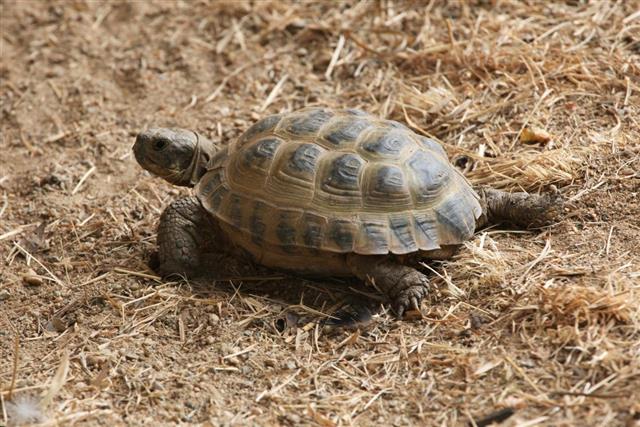
Longevity depends on a tortoises stress levels and diet as well as environmental factors. The body is a straw.

Russian tortoises are considered sexually dimorphic.
How long do russian tortoises live for. Russian Tortoises commonly live over 40 years in captivity. Longevity depends on a tortoises stress levels and diet as well as environmental factors. Part of the appeal of having a pet such as a tortoise is its unusually long life span.
Russian tortoises usually live 30 to 40 years but there are cases when a russian tortoise can end up living more than 50 years. As you can see the amount of time a russian tortoise will live is not very well defined. The typical Russian tortoise lifespan can exceed 40 years when healthy.
Like many other tortoise species these reptiles have a long life expectancy. Description of the Russian Tortoise. These tortoises are popular pets because they do not grow too large.
On average they range between 5 10 inches long when fully grown. In comparison another pet tortoise species the Aldabra giant tortoise grows up to 36 feet long and 550 pounds. Russian tortoises are considered sexually dimorphic.
This tortoise can be a lifelong pet they often live for over 40 years. Red Foot Tortoise Lifespan red footed tortoise lifespan The lifespan of a red-footed tortoise can vary depending on many factors but most indications are that they can live for more than 50 years. Sulcata Tortoise Lifespan the Sulcata tortoise can live anywhere from 50 all the way up to 150 years old.
Russian tortoises are native to the continent of Asia more specifically in the Ukraine Russia Afghanistan Pakistan Iran and parts of China. How Long Do They Live and How Big Are They. Like with more land tortoises they tend to live up to 100 years so before you get a Russian tortoise make sure that youre prepared for a life-long commitment.
Russian Tortoise Life Span Russian tortoises can live more than 40 years. Raised on a lean high-fiber diet captive-raised animals in low-stress environments have higher life expectancies. This is true even with long term wild caught and captive born animals.
Make sure the Vet measures and weighs your tort. Also request a fecal to check for parasites. To see what may be hidden in your tortoise click here.
Russian Tortoises are grazers and enjoy broad leaf plants. The best diet is a variety of weeds leaves and flowers. Regardless of their vulnerable IUCN Red List status Russian tortoises have been successfully bred and can be acquired from reputable breeders.
The Russian tortoise has an average captive lifespan of 40 years. However this species can live to 100 years. Russian tortoises Testudo horsefieldi are wonderful little tortoises with big personalities.
Ranging in size from 5 to 8 inches long and weighing about a half pound to two and a half pounds 300 to 1500 gms they can be kept outdoors in Arizona or can often do quite well with relatively modest indoor caging. Thankfully Russian tortoises are relatively easy to care for and make an excellent pet for novice tortoise keepers. That being said they are long-lived with an average lifespan of 50 years.
You have to consider this before you go out and get one. How Long Can a Tortoise Live with a Respiratory Infection. As weve mentioned before tortoises are resilient animals.
When they do get sick they can recover from it. If that werent the case then they shouldve died out millions of years ago. Now just like other animals tortoises can catch colds both in the wild and in captivity.
Russian tortoises can live up to 50 years. On top of that some tortoise species are able to undergo hibernation or brumation which can significantly lessen their need for food. In general a healthy adult tortoise can live for as much as 6 months to 3 years without food provided that they have access to drinking water and their other needs are met.
With proper care these small reptiles can live up to 40 years making them a long-term but delightful commitment. The shell of a Russian tortoise is usually a ruddy brown or black color which lightens to yellow in between the scutes. The body is a straw.
As a result of this slow down they will need considerably less oxygen sometimes due to unfortunate situations Russian tortoises dont have access to oxygen at all but because they are hibernating they are able to live without oxygen up to 5 monthsThey can also survive for.